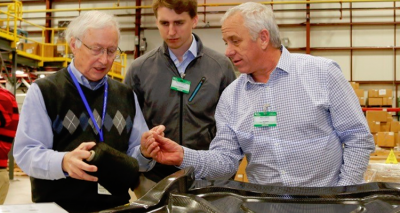The old Theragenics facility in Oak Ridge will soon be getting a facelift thanks to a $125 million investment by LeMond Composites. This announcement is not only opening the door for East Tennesseans by offering 242 high-paying jobs but also for the state’s economy.
 LeMond Composites is part of LeMond Companies, a group led by three-time Tour de France winner Greg LeMond.
LeMond Composites is part of LeMond Companies, a group led by three-time Tour de France winner Greg LeMond.
Economic and Community Development Commissioner Randy Boyd alongside company officials announced LeMond Composites will begin making a new industry-disrupting carbon fiber for the transportation, renewable energy and infrastructure markets.
Carbon fiber is a strong, lightweight material used for advanced composites in a variety of applications including making both bikes and vehicles more efficient by making them weigh less.
LeMond Composites “Grail” carbon fiber is low-cost and high-quality and its changing the industry because not only is it more affordable but the way it’s produced uses substantially less energy compared to other carbon fiber manufacturing processes.
With the invention of “Grail” carbon fiber, Corporate Average Fuel Economy (CAFE) standards of 54.5 mpg by 2025 are now achievable.

Photo Credit: Composites Manufacturing Magazine
The former professional road racing cyclist says he was exposed to his first carbon fiber bike 30 years ago. Just as weight in a car requires more energy consumption, riding like LeMond did requires more energy if the bicycle is heavier.
Today, LeMond Composites has executed a license with ORNL for what the company describes as “one of the most significant developments in carbon fiber production in over 50 years.”
A breakthrough process invented by Connie Jackson, Co-CEO of LeMond Composites and a research team at ORNL’s Carbon Fiber Technology Facility (CFTF) will reduce production costs by more than 50% relative to the lowest cost industrial grade carbon fiber. Incredibly this new carbon fiber has the mechanical properties of carbon fiber costing three times as much. Until now, manufacturing carbon fiber was an extremely energy-intensive process. This new method reduces energy consumed during production by up to 60%.
LeMond plans to break ground on the new facility in January and the first commercially available product will be ready in the first quarter of 2018.
